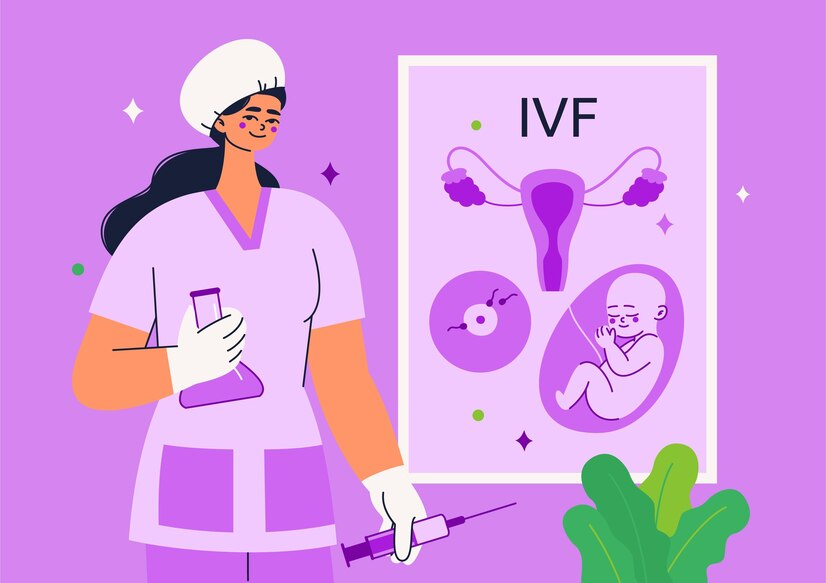What Kind of Lab and Technology Does Your IVF Clinic Use?
- Vikas Singh
- Aug 4
- 4 min read
When it comes to In Vitro Fertilization (IVF), the success of your treatment relies heavily not only on the expertise of the fertility specialist but also on the quality of the laboratory and technology used in the process. A state-of-the-art IVF lab is the backbone of any reputable fertility clinic in Delhi, and the level of equipment, technological innovation, and lab standards can significantly influence outcomes.
In this blog, we’ll explore the types of technologies, lab infrastructure, and protocols that a modern, high-performing IVF clinic typically uses — and why they matter.

1. The IVF Laboratory: The Heart of the Clinic
An IVF lab is where the critical phases of fertilization and early embryo development occur. The lab should be designed to create a clean, stable, and controlled environment that mimics the human body as closely as possible. Here are some key features of an advanced IVF lab:
a. Air Quality Control
Air quality in an IVF lab is crucial. Pollutants like volatile organic compounds (VOCs) and microscopic particles can damage eggs, sperm, and embryos.
HEPA and carbon filters are used to maintain clean air.
Positive pressure airflow systems ensure that unfiltered air cannot enter the lab.
ISO certification, especially ISO Class 5 or 6, indicates a high standard of cleanliness.
b. Temperature and Humidity Control
Embryos are highly sensitive to environmental changes. Modern labs maintain precise:
Temperature regulation (typically 37°C in incubators)
Stable humidity levels to prevent evaporation and dehydration
2. Embryology Technology and Equipment
a. High-Resolution Microscopes
Embryologists rely on advanced microscopes to examine eggs, sperm, and embryos. High-magnification and time-lapse imaging technologies allow embryologists to:
Identify the healthiest eggs and sperm
Monitor embryo development without disturbing their environment
Perform micromanipulation for ICSI (Intracytoplasmic Sperm Injection)
b. ICSI Micromanipulators
ICSI is often used when there is male factor infertility. The procedure involves injecting a single sperm directly into an egg. It requires:
Precision micromanipulators
Skilled embryologists with extensive experience
3. Advanced Incubation Systems
Gone are the days of standard incubators. Modern IVF clinics use Benchtop Incubators or Time-Lapse Incubators (like EmbryoScope) to closely monitor embryo development.
Benefits:
Non-invasive monitoring: Images are captured at regular intervals, eliminating the need to remove embryos from their controlled environment.
Improved embryo selection: Algorithms help identify embryos with the highest implantation potential.
Stable conditions: Prevents temperature and pH fluctuations.
4. Genetic Screening and Testing Technologies
Preimplantation Genetic Testing (PGT) has revolutionized IVF success rates, especially for couples with recurrent miscarriage, genetic disorders, or advanced maternal age.
Types of PGT:
PGT-A (for aneuploidy): Checks for chromosomal abnormalities
PGT-M (for monogenic diseases): Screens for inherited single-gene disorders
PGT-SR (for structural rearrangements): Detects translocations or inversions
These tests are performed using high-end tools like:
Next-Generation Sequencing (NGS)
Array Comparative Genomic Hybridization (aCGH)
5. Cryopreservation Technology
Freezing eggs, sperm, and embryos is now standard practice in IVF. However, the method of freezing plays a big role in success:
a. Vitrification
Modern clinics use vitrification — a fast-freezing technique that prevents ice crystal formation and significantly improves post-thaw survival rates.
Used for egg freezing, embryo freezing, and sperm freezing
Requires advanced cryostorage systems and highly trained technicians
b. Automated Storage Systems
Liquid nitrogen-based storage tanks are monitored continuously to maintain the correct temperature (-196°C), with alarms for any irregularities.
6. AI and Machine Learning in Embryo Selection
The future of IVF is already here, thanks to Artificial Intelligence. Leading clinics are integrating AI tools to assess and grade embryos based on time-lapse videos and morphological data.
Benefits:
Removes subjectivity from embryo grading
Improves embryo selection accuracy
Increases implantation and pregnancy rates
Examples include platforms like iDAScore, Life Whisperer, and EmbryoRank.
7. Sperm Analysis and Selection Technologies
Male fertility is equally important in IVF success. Modern clinics offer:
a. Computer-Assisted Semen Analysis (CASA)
This system evaluates sperm motility, morphology, and concentration more accurately than manual analysis.
b. Magnetic-Activated Cell Sorting (MACS)
MACS separates healthy sperm from those with DNA fragmentation, improving outcomes in ICSI cycles.
c. Microfluidic Sperm Sorting
This technique mimics the female reproductive tract to select the best quality sperm for fertilization.
8. Lab Accreditation and Quality Assurance
When choosing an IVF clinic, look for lab accreditation by national or international organizations such as:
NABL (India)
CAP (College of American Pathologists)
ESHRE (European Society of Human Reproduction and Embryology)
Regular audits, strict standard operating procedures (SOPs), and a quality control system ensure high lab performance and consistent outcomes.
9. Telemonitoring and Digital Records
Modern clinics integrate digital systems to maintain transparency and communication:
Real-time embryo development updates
Electronic medical records (EMR)
Cloud-based lab management systems
Patients can track the progress of their treatment and understand decisions with clarity and confidence.
Conclusion
The success of IVF depends on far more than just medications and appointments — it is built on the foundation of precision science, clean environments, and advanced technology inside the lab. As a patient, it's your right to ask about the lab standards, technologies, and expertise of the embryology team before choosing a fertility clinic.
When you choose a clinic that uses top-tier lab infrastructure, cutting-edge technologies, and has skilled embryologists and geneticists at the helm, you’re significantly improving your chances of IVF success.
Always remember: a high-tech IVF lab isn’t just impressive — it’s essential.
Visit Dr. Poonam Goyal Clinic for fertility treatment in Delhi : Dr. Poonam goyal
Address : HOD IVF & Infertility, MAX SUPERSPECIALITY HOSPITAL, Sector 5, Vaishali, Ghaziabad
Contact us : 098110 81811




Comments